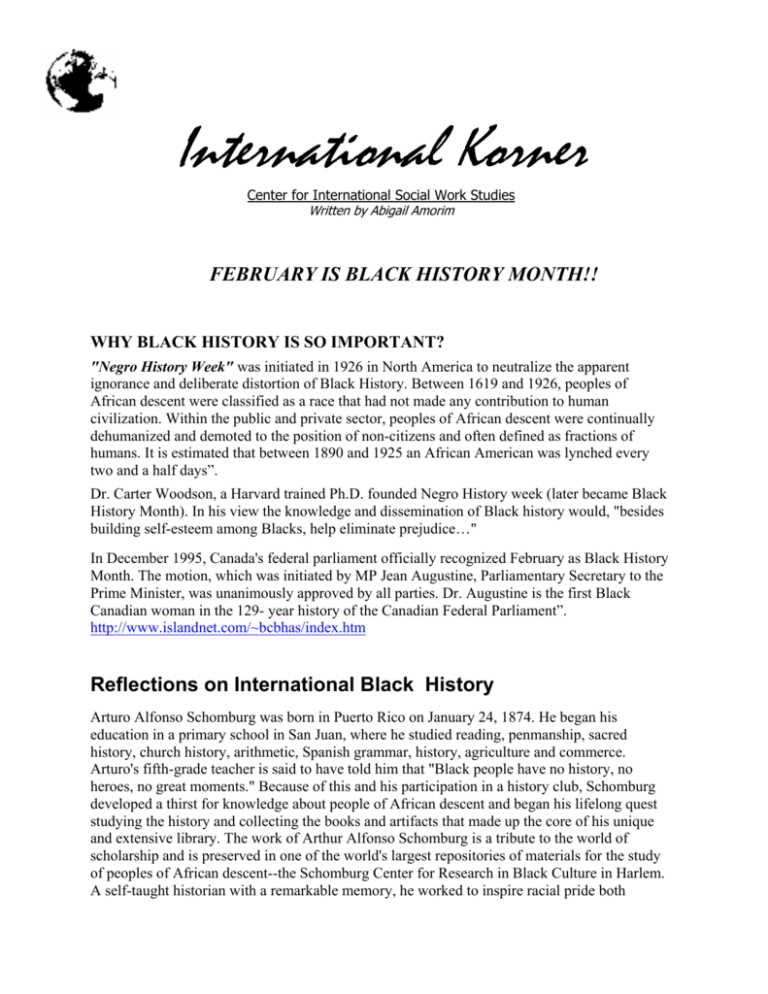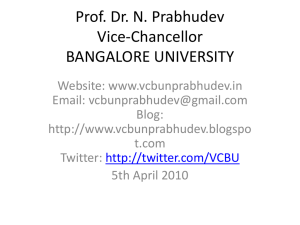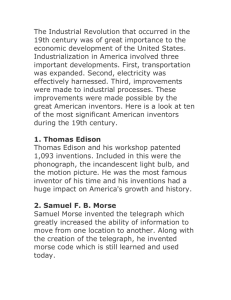Issue 2 – Spring 2003 - School of Social Work
advertisement

International Korner Center for International Social Work Studies Written by Abigail Amorim FEBRUARY IS BLACK HISTORY MONTH!! WHY BLACK HISTORY IS SO IMPORTANT? "Negro History Week" was initiated in 1926 in North America to neutralize the apparent ignorance and deliberate distortion of Black History. Between 1619 and 1926, peoples of African descent were classified as a race that had not made any contribution to human civilization. Within the public and private sector, peoples of African descent were continually dehumanized and demoted to the position of non-citizens and often defined as fractions of humans. It is estimated that between 1890 and 1925 an African American was lynched every two and a half days”. Dr. Carter Woodson, a Harvard trained Ph.D. founded Negro History week (later became Black History Month). In his view the knowledge and dissemination of Black history would, "besides building self-esteem among Blacks, help eliminate prejudice…" In December 1995, Canada's federal parliament officially recognized February as Black History Month. The motion, which was initiated by MP Jean Augustine, Parliamentary Secretary to the Prime Minister, was unanimously approved by all parties. Dr. Augustine is the first Black Canadian woman in the 129- year history of the Canadian Federal Parliament”. http://www.islandnet.com/~bcbhas/index.htm Reflections on International Black History Arturo Alfonso Schomburg was born in Puerto Rico on January 24, 1874. He began his education in a primary school in San Juan, where he studied reading, penmanship, sacred history, church history, arithmetic, Spanish grammar, history, agriculture and commerce. Arturo's fifth-grade teacher is said to have told him that "Black people have no history, no heroes, no great moments." Because of this and his participation in a history club, Schomburg developed a thirst for knowledge about people of African descent and began his lifelong quest studying the history and collecting the books and artifacts that made up the core of his unique and extensive library. The work of Arthur Alfonso Schomburg is a tribute to the world of scholarship and is preserved in one of the world's largest repositories of materials for the study of peoples of African descent--the Schomburg Center for Research in Black Culture in Harlem. A self-taught historian with a remarkable memory, he worked to inspire racial pride both through his organizations and through the encouragement of study and research on black themes. (http://www.si.umich.edu/CHICO/Harlem/text/aschomburg.html) Carolina Maria de Jesus was a destitute black Brazilian woman born (1914) in the rural interior who migrated to São Paulo, the largest industrial city in South America, seeking to find work and a better life. The great-grandchild of slaves, she became literate on her own, having attended school for less than two years. As a young girl, she developed a passion for reading. Later, this fed her desire to write down her feelings and to tell her story. In 1958 a reporter, Audálio Dantas, discovered that she had written a diary about her hard life; he managed to edit it, publish some of the entries in his newspaper, and, in August 1960, had it printed under the title Quarto de Despejo. It became the best-selling book in Brazilian history, and made its author world famous. Carolina wrote four other books, which were published without success, and many poems, short stories, and memoir fragments. Only a few years after her mercurial success, however, she was forced back into poverty. She died in 1977 ignored. (http://www.islandnet.com/~bcbhas/bhmonth.htm) ✱✱✱ Famous personalities known internationally ✱✱✱ • Nelson Mandela, President of South Africa. • Kofi Annan of Ghana is the seventh Secretary-General of the United Nations. • Afua Cooper of Jamaica, writer. Among his works are: The Red Caterpillar on College Street Breaking Chains Memories Have Tongues • Jacques Roumain - Haiti - writer 1907Masters of the Dew (1944) • Neil Bissoondath - Trinidad - writer Digging Up the Mountains (1985) A Casual Brutality (1988) On the Eve of Uncertain Tomorrows (1990) The Innocence of Age (1992) Selling Illusions: The Cult of Multi-Culturalism in Canada • Julia Alvarez- Dominican Republic Homecoming(1984) How the Garcia Girls Lost Their Accents (1991) In the Time of the Butterflies (1994) The Other Side/El Otro Lado (1995) Yo (1997) Fact Sheet What If There Were No Black People . . . ??? This is a story of a little boy named Theo who woke up one day and wondered what it would be like if there were no Black people in the world. Well his mother thought about that for a moment and then said, "Son, follow me around today and let's just see what it would be like if there were no Black people in the world." Mom said, "Now go get dressed and we will get started." She took one look at him and said, "Theo, where are your shoes? Those clothes are all wrinkled son. I must iron them." But when she reached for the ironing board it was no longer there. You see, Sarah Boone, a Black woman, invented the ironing board and Jan E. Matezelinger, a Black man, invented the shoe lasting machine. "Oh, well," she said. "Please go and do something to your hair." Theo ran into his room to comb his hair, but the comb was not there. You see, Walter Sammons, a Black man, invented the comb. Theo decided to just brush his hair, but the brush was gone. You see, Lydia O. Newman, a Black woman, invented the brush. Well, this was a sight. No shoes, wrinkled clothes, hair a mess, even Mom's hair, without the hair care inventions of Madam C. J. Walker. Well you get the picture. Mom told Theo, "Let's do our chores around the house and then take a trip to the grocery store." Theo's job was to sweep the floor. He swept and swept and swept. When he reached for the dust pan, it was not there. You see Lloyd P. Ray, a Black man, invented the dust pan. So he swept his pile of dirt over in the corner and left it there. He then decided to mop the floor, but the mop was gone. You see, Thomas W. Stewart, a Black man, invented the mop. Theo yelled to his Mom, "I'm not having any luck!" "Well son," she said, "let me finish washing these clothes and we will prepare a list for the grocery store." When the wash finished, she went to place the clothes in the dryer, but it was not there. You see, George T. Sarnon, a Black man, invented the clothes dryer. Mom asked Theo to go get a pencil and some paper to prepare their list for the market. So Theo ran for the paper and pencil, but noticed the pencil lead was broken. Well he was out of luck because John Love, a Black man, invented the pencil sharpener. Mom reached for a pen, but it was not there because William Purvle, a Black man, invented the fountain pen. As a matter of fact, Lee Burridge invented the type writing machine and W.A. Lovette the advanced printing press -- both Black men. Theo and his mother decided to head out to the market. Well when Theo opened the door he noticed the grass was a high as he was tall. You see, the lawn mower was invented by John Burr, a Black man. They made their way over to the car, found that if just wouldn't go. Richard Spikes, a Black man, invented the automatic gear shift and Joseph Gammel, a Black man, invented the supercharge system for internal combustion engines. They noticed that the few cars that were moving were running into each other and having wrecks because there were no traffic signals. You see, Garrett Morgan, a Black man, invented the traffic light. Well, it was getting late, so they walked to the market, got their groceries and returned home. Just when they were about to put away the milk, eggs and butter, they noticed the refrigerator was gone. You see, John Standard, a Black man, invented the refrigerator. So they just left the food on the counter. By this time, Theo noticed he was getting mighty cold. Mom went to turn up the heat and what do you know: Alice Parker, a Black woman, invented the heating furnace. Even in the summer time they would have been out of luck because Frederick Jones, a Black man, invented the air conditioner. It was almost time for Theo's father to arrive home. He usually takes the bus, but there was not bus because its precursor was the electric trolley, invented by another Black man, Elbert R. Robinson. He usually takes the elevator from his office on the 20th floor, but there was no elevator because Alexander Miles, a Black man, invented the elevator. He also usually dropped off the office mail at a nearby mailbox, but it was no longer there because Philip Downing, a Black man, invented the letter drop mailbox and William Barry, a Black man, invented the postmarking and canceling machine. Theo and his mother sat at the kitchen table with their head in their hands. When the father arrived he asked, "Why are you sitting in the dark?" Lewis Howard Latimer, a Black man, invented the filament within the light bulb. Theo quickly learned what it would be like if there were no Black people in the world, not to mention if he were ever sick and needed blood. Charles Drew, a Black scientist, found a way to preserve and store blood, which led to his starting the world's fist blood bank. And what if a family member had to have heart surgery? This would not have been possible without Dr. Daniel Hale Williams, a Black doctor, who performed the first open-heart surgery. http://www.islandnet.com/~bcbhas/index.htm







